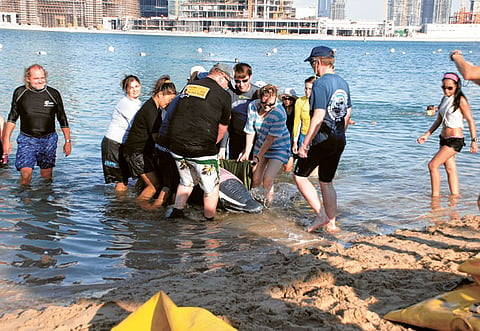Marine mammal rescue course for better awareness
Dugongs, dolphins at risk in busy shipping areas

Dubai: Busy shipping areas pose a serious threat to marine mammals such as dugongs, whales or dolphins.
Knowing what to do if one ever washed up on shore after a collision could therefore be vital to saving what are fast-becoming endangered animals.
Having the skills to save just one can make a difference, said Stephen Marsh, operations manager for the British Divers Marine Life Rescue (BDMLR), the primary marine animal rescue organisation in the UK.
"Dugongs, for example, only reach sexual maturity at the age of 16 or 17 years, gestation takes over a year and they give birth to one calf every seven years. If an animal washes up on shore then it's most likely sick and if we can nurse it back to health and put it back in the water it will definitely help the population," said Marsh.
Currently in the UAE, Marsh and his colleague Richard Ilderton, from BDMLR, were invited by the Emirates Natural History Group to host two workshops in Dubai and Abu Dhabi on marine mammal rescue last week.
It was also the topic for a lecture held last Tuesday in Abu Dhabi, organised by the Emirates Natural History Group.
Protected by law
The dugong population in the Arabian Gulf is believed to be the second largest in the world after Australia. For more than two decades, dugongs in UAE waters have been protected by law which prohibits their exploitation. A ban on drift net fishing in the UAE waters has also helped in minimise dugong mortalities.
No statistics were available from the Environment Agency — Abu Dhabi (EAD) on the number of known beached mammals in the emirate or reported beachings in the UAE of any marine mammal.
However, EAD conducted aerial surveys of UAE waters of the Arabian Gulf during the summer of 2000 and winter of 2001 and estimated the population of dugongs to be 1,861.
Around 50 people took part in the marine mammal rescue course which was held in collaboration with the Emirates Diving Association and the Emirates Marine Environment Group.
"There is no infrastructure at the moment for marine mammal rescue. Some of the marine organisations are interested in acquiring equipment which is vital when dealing with such large animals," said Marsh.
During the course, participants were taught handling, lifting and first aid techniques using a life-like and life-sized water-filled model of a common dolphin and helped refloat a two-tonne life-sized model of a pilot whale.
Those who attended the course were also taught how to handle an injured or stranded dugong.



